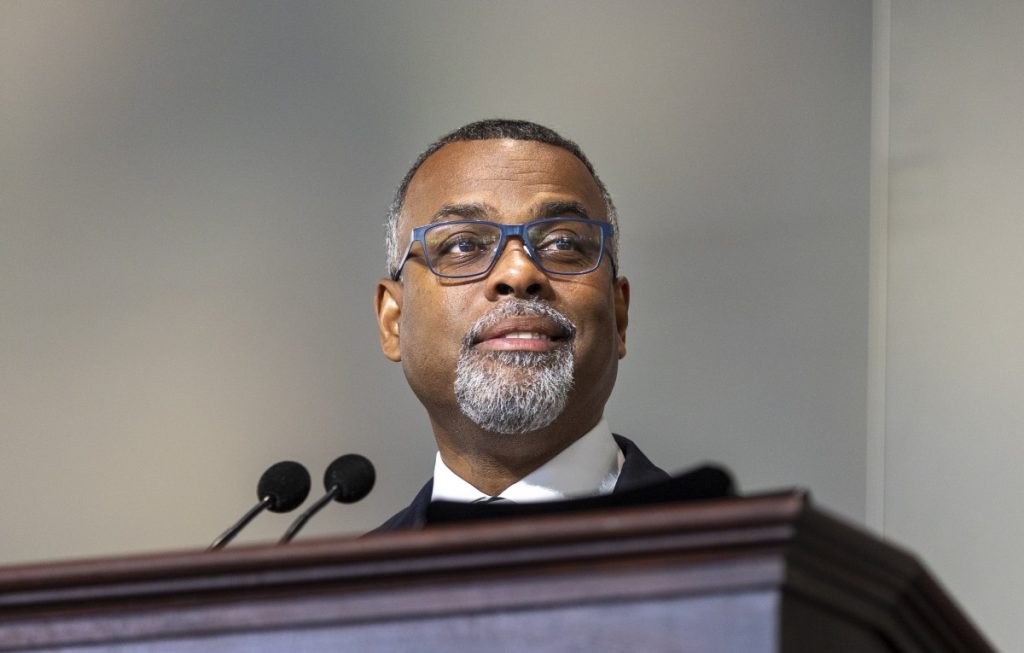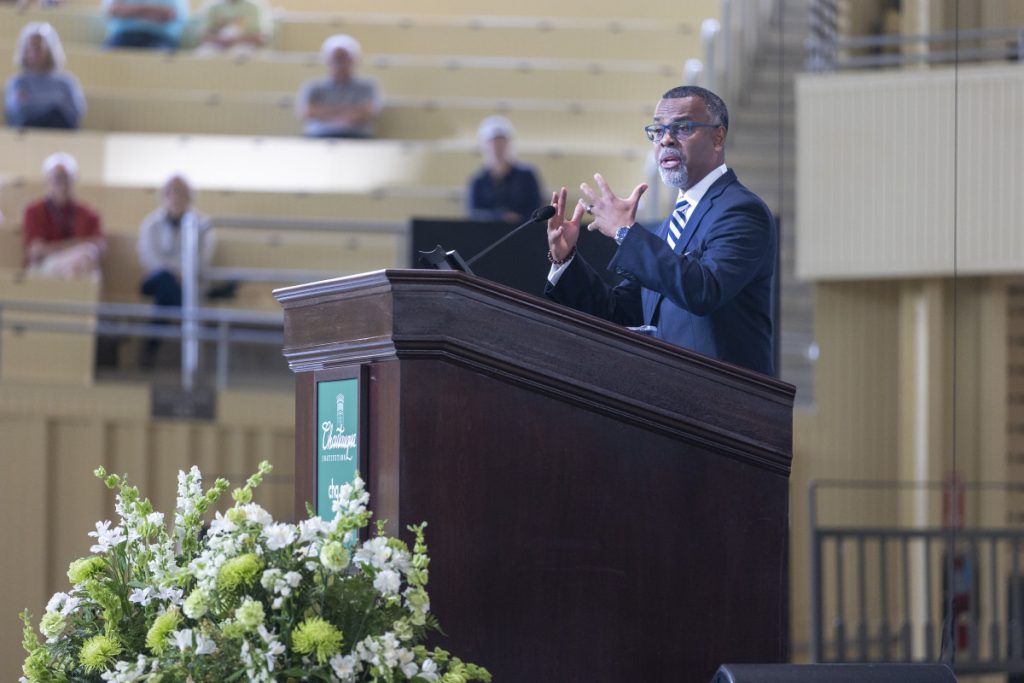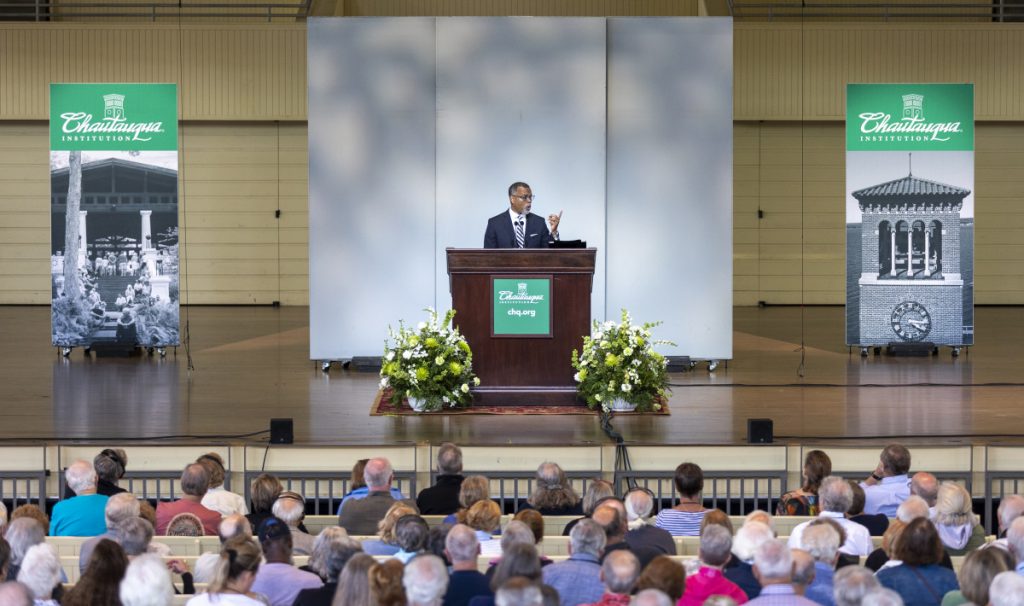NICK DANLAG – STAFF WRITER

Eddie S. Glaude Jr. began his lecture by quoting Toni Morrison.
“If my work is to be functional to the group, to the village as it were, then it must bear witness and identify that which is useful from the past and that which ought to be discarded. It must make it possible to prepare for the present and live it out and it must do that not by avoiding problems and contradictions, but by examining them. It should not even attempt to solve social problems, but it certainly should try to clarify them,” Morrison said.
Glaude said America has an old myth when it comes to Black people — that Black people are inherently lesser, and white people are inherently more morally just.
“This vision of this new Black subject makes sense only if we are to understand a certain view of white people in this country — how white people are valued more than others and how that valuation dictates the distribution of advantages and disadvantages,” he said.
Glaude is the chair of the Department of African American Studies and James S. McDonnell Distinguished University Professor at Princeton University. At 10:30 a.m. on Thursday, July 22 in the Amphitheater, Glaude concluded the Chautauqua Lecture Series Week Four theme of “Many Americas: Navigating Our Divides.” This was a joint presentation between the Chautauqua Lecture Series and the Chautauqua Literary and Scientific Circle. Glaude’s most recent book, Begin Again: James Baldwin’s America and Its Urgent Lessons for Our Own, was a CLSC Week Four selection.
During the lecture, Glaude used Baldwin’s writing to discuss how embedded racism is in America, how the country has failed to address it in every era, and the need for society to accept truths about ourselves and others.
“The idea of American democracy John Locke imagined, shorn of its need for this staid character of Black people, has yet to come into fruition,” Glaude said. “We still live in a society where some of us believe that this country must remain a white nation in the vein of old Europe, where the stock assumptions about Black people continue to circulate.”
Glaude said the Jan. 6 insurrection was the latest expansion of the notion that the country belongs to some more than it does to others.
“What was revealed and continues to unfold right before our eyes, at least to me,” Glaude said, “is clearly a different register of civic expression, a different kind of citizenship, of those who have a right to dissent, and who can claim ownership of the country, while the rest of us are expected to shut up and be grateful because the country belongs to them.”
He quoted Baldwin: “The horror is that America changes all the time without ever changing at all.”
Glaude said it is time to admit that everyone is not treated equally in this country and everyone is not policed in the same manner.
“All we have to do is think back to Jan. 6 and compare how the police responded to that mob and how they responded to some of the peaceful protests last summer,” Glaude said.
Glaude described the deep division in the U.S. as a “cold Civil War,” in which there is a fear that increasing diversity means white people’s power is diminishing, and that they are at risk of being replaced.
“History reveals itself not as determination, but as a kind of inherence,” Glaude said. “Not as continuity, but as connection and relationship where one event echoes or carries the imprint of another, and calls it all into view.”
Glaude said the country has been here before. He talked about the Civil War and Reconstruction, when lawmakers in Mississippi, who Frederick Douglass called the “Apostles of Forgetfulness,” created Jim Crow laws after the 13th Amendment was ratified.
Glaude said this “Anglo-Saxonism is in all of us,” meaning the idea that old European cultures are model societies.
“We see the ideology of Anglo-Saxonism guiding our imperial efforts across the globe. At the very moment we were consolidating racial apartheid in the American South, we were bringing millions of people of color under our rule in Cuba and the Philippines,” Glaude said.
Glaude said that every time America has faced a moral reckoning like the current one, society has “doubled down on our ugliness.”
“At every turn when a new America is about to be born,” Glaude said, “the umbilical cord of white supremacy has been wrapped around the baby’s neck, choking the life out of it.”
Many Americans breathed a sigh of relief when Joe Biden was elected and believed that their work was done — but Glaude said the work doesn’t end based on who is in the White House.
“I pray that we do not trade one fantasy for another. That somehow the election of a politician affirms America’s inherent goodness and puts a grateful republic back to sleep,” Glaude said. “Presidential elections — elections period, no matter how momentous — do not settle the question of who we take ourselves to be. The answer to that question, and it is a moral as well as a political question, will emerge as what we do now.”

What society needs to do now, Glaude said, is to tell the truth about America, from its flaws to its triumphs. He said the country’s original sin wasn’t slavery, or even its genocide against Native Americans, but the belief that some people matter more than others.
Part of the way people can help tell the truth of the country is by telling different stories about history. Truth requires courage, Glaude said.
He also said the truth will require people to grow up.
“This is the root of our unadmitted sorrows. The terrors and panics that we experience today have everything to do with the gap between who we imagine ourselves to be and who, deep down, we really are. That the nation actively evades confronting this gap locks the country into a kind of perpetual adolescence where those who desperately hold onto the American myth refuse to grow up,” Glaude said.
People will also have to come out of their comfort zones and imagine themselves in a new way, he said, or risk doubling down on ugliness.
“The future of the world depends on everyone in this room,” Glaude said. “Imagination is a source of the good. There’s those who would want you to believe that our world is all that is possible. We must dare to imagine ourselves differently.”
As part of the Q-and-A session, Sony Ton-Aime, the Michael I. Rudell Director of the Literary Arts, asked Glaude about the backlash seen throughout history whenever steps are taken to uphold people’s civil rights, even now with suppression of voting rights.
Glaude said he doesn’t use the term “backlash” because it carries the implication the movement asked too much.
“One of the questions that James Baldwin loathed was this question: How much more does the Negro want?” Glaude said. “And I do, too, because if you thought we were human beings like you think of yourself, you would know we want the same thing as you.”
Glaude said what is happening is not a backlash, but a betrayal.
“It shows in America there’s still an argument to be had,” Glaude said, “and you still have to fight.”

Ton-Aime then asked Glaude what the outrage around critical race theory is really about.
Glaude said in the early 1900s, large, public swimming pools were built in different cities to help bring together different communities and cultures. He said when Black people came to share the pools, fearful white people filled the pools with concrete and turned them into grass fields. White people were scared of being displaced by people of color, and this fear still permeates society.
“There’s a sense that the ‘browning of America,’ ” Glaude said, “left certain Americans behind, that they’re being left behind, and could be displaced, replaced.”
Some people argue that critical race theory removes them from history, and, Glaude said, and fills “(white) children’s heads with ideas they are somehow responsible for the ugliness of the world.”
He said that one prominent conservative tweeted that they want to use the outrage around the term “critical race theory” to cause a broad ban on everything they do not like.
“This is part of this ongoing effort to narrow our conception of America,” Glaude said.
Ton-Aime asked Glaude how he keeps going in the face of trauma.
Glaude recalled one particularly difficult day that drove him to a emotional verbal outburst, “just cussing at the top of my lungs, you know.” He had to compose himself in time to deliver an online lecture.
“It’s hard, but you have a sense of calling, a sense of vocation, a commitment to building a world that is better for our children and our children’s children,” he said.
He said there is so much about the world that conspires to make people small, to conform.
“The question you have to ask yourselves, over and over again as the world tries to make you small — will you be complacent? Will you be complacent?” Glaude said. “Good old Melville comes to mind, ‘Bartleby, the Scrivener’: ‘I prefer not to.’ ”
John Coltrane also came to Glaude’s mind. He told the story of a recording of “Giant Steps.” Coltrane played the introductory solo to “Giant Steps,” and the musicians around him had never heard something like it in their lives. On the track, the pianist is so confused that he is just tapping keys.
“So, if the world conspires to make you small, to make you conform,” Glaude said, “then what you should do is take ‘Giant Steps.’ So how do I keep going on? How do I muster the energy to stand in the tradition that makes me possible? I refuse to conform to the world as it is and I am going to give my life to make the world as it could be.”




